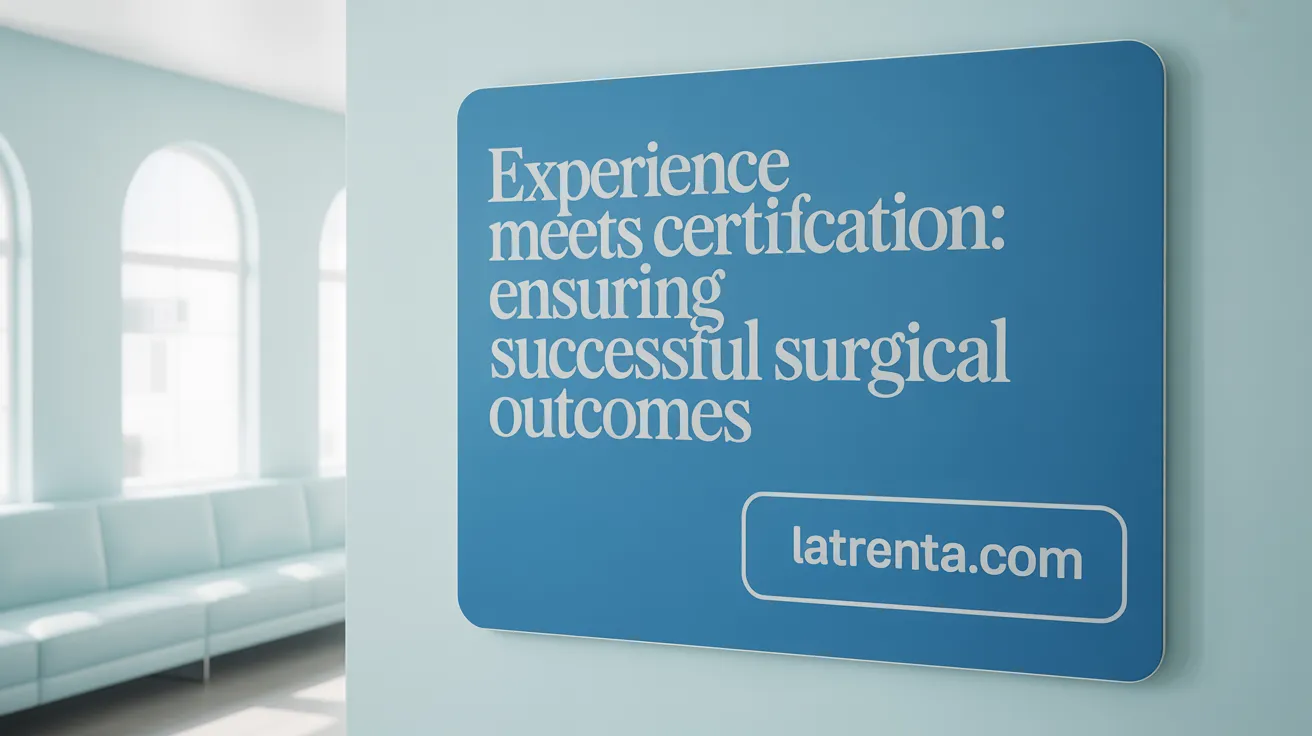Understanding the Critical Importance of Double Board Certification
In the realm of plastic and facial surgery, the credentials and qualifications of the surgeon are paramount to ensuring patient safety and achieving outstanding results. Double board certification serves as a hallmark of extensive training, proven expertise, and a commitment to ethical, high-quality care. This article explores why choosing a double board-certified surgeon is essential, how their training affects patient outcomes, and the pivotal role that experience plays in surgical success.
The Significance of Double Board Certification in Plastic and Facial Surgery

What is double board certification?
Double board certification indicates that a surgeon has achieved certification from two recognized medical boards, typically in plastic surgery and another specialty such as facial plastic and reconstructive surgery or head and neck surgery. It signifies that the surgeon has completed extensive and specialized training, allowing them to perform both cosmetic and reconstructive procedures with a high level of expertise.
How do surgeons achieve this certification?
To become double certified, surgeons must complete a minimum of five years of rigorous training, including an accredited residency in their primary specialty and an additional fellowship or training in a focused area. They must pass comprehensive written and oral examinations from each relevant medical board. Successfully obtaining double certification generally involves submitting operative reports for numerous procedures, demonstrating proficiency in complex cases.
Why is ongoing education and ethical standards important?
Maintaining double certification requires surgeons to engage in continuous professional development. They stay current with the latest innovations, techniques, and safety protocols through conferences, research, and coursework. Certification bodies also emphasize strict ethical standards, ensuring that surgeons prioritize patient safety, transparency, and honest communication.
How does it translate into proficiency and patient confidence?
Surgeons with double certification have proven their competence in managing complex anatomical challenges and performing a wide range of procedures. Their extensive training and experience often lead to better outcomes, especially in intricate cases like rhinoplasty or facial reconstruction. Patients can feel reassured knowing their surgeon has met the highest standards of education, skill, and ethical care.
Peace of mind when choosing a specialist
Opting for a double board-certified plastic or facial surgeon provides peace of mind. It reflects a doctor’s dedication to excellence, commitment to lifelong learning, and adherence to safety protocols. This certification is often associated with higher success rates, reduced risks, and personalized, natural results, making it a crucial consideration for anyone seeking aesthetic or reconstructive surgery.
How Surgeon Certifications and Specialized Qualifications Enhance Safety and Outcomes

How do surgeon certifications and specialized qualifications impact patient safety and surgical outcomes?
Certifications from recognized medical boards are a vital indicator of a surgeon’s expertise and commitment to high standards of care. Surgeons with double board certification, for example, have completed extensive training that covers both general and specialized areas like plastic or facial surgery. These rigorous qualifications include years of residency, fellowship programs, and passing comprehensive exams, which ensure they are well-versed in anatomy, surgical techniques, and patient management.
Patients benefit from choosing certified surgeons because these professionals prioritize safety, adhere to strict ethical guidelines, and stay current with the latest advancements through continuous education. Certified surgeons are better equipped to handle complex cases, reducing the likelihood of complications and enhancing the predictability of surgical results.
What standards and protocols do certified surgeons follow?
Surgeons certified by reputable boards follow strict safety protocols that emphasize thorough preoperative assessments, meticulous operative techniques, and comprehensive postoperative care. They participate in ongoing training and research, which helps them implement evidence-based practices that improve patient outcomes. These standards are designed to minimize risks such as infections, adverse reactions, and functional impairments.
How does ongoing education contribute to better results?
Maintaining certification requires surgeons to engage in continuous learning through courses, conferences, and research. This helps them stay updated on innovative procedures, new technologies, and contemporary safety measures. Such ongoing professional development ensures that surgeons are proficient in the latest techniques, which not only enhances aesthetic results but also reduces operative and recovery risks.
Is there evidence supporting the role of certification in reducing complications?
Yes. Studies have shown that surgeries performed by board-certified surgeons often have lower complication rates and higher patient satisfaction. Their extensive training and adherence to safety standards contribute directly to these improved outcomes. Certification serves as a significant marker for quality, reassuring patients about the skill level and reliability of their surgeon.
| Aspect | Impact | Explanation |
|---|---|---|
| Training and experience | Higher competency | Certification involves thorough training, influencing skill and decision-making. |
| Safety protocols | Reduced risk of complications | Strict adherence to safety standards minimizes adverse events. |
| Continuous education | Updated techniques and knowledge | Ongoing learning ensures surgeons are current with best practices. |
| Patient outcomes | Better aesthetic and functional results | Expert training and standards translate into higher quality procedures. |
Choosing a double or even triple-certified surgeon ensures a higher level of expertise, emphasizing patient safety, effective outcomes, and confidence in care. Ultimately, through rigorous testing, ongoing education, and a commitment to excellence, certified surgeons deliver superior results in aesthetic and reconstructive procedures.
Experience and Certification: A Foundation for Successful Surgical Results

What benefits do experience and certification provide for successful surgical results?
Having a highly experienced and certified surgeon greatly improves the chances of achieving optimal results. Double board certification, in particular, signifies that a surgeon has undergone extensive training, including at least five years of residency and additional fellowship programs focused on specific procedures like facial plastic or reconstructive surgery. This rigorous process involves passing both written and oral exams, which assess mastery over complex anatomy, technical skills, and safety protocols.
Surgeons with such credentials are well-versed in managing complicated cases and are adept at handling unexpected challenges during surgery. Their ongoing participation in professional development activities—such as advanced courses, conferences, and research—keeps their skills sharp and up-to-date. This continuous learning translates into improved precision, reduced risks, and natural-looking outcomes.
Choosing a surgeon with extensive experience and certification also provides patients with peace of mind. Certified surgeons follow strict ethical standards and safety guidelines, emphasizing patient well-being and transparent communication. This accountability not only minimizes surgical risks but also fosters trust and satisfaction.
Overall, experienced, double board-certified surgeons are better equipped to deliver safe, effective, and aesthetically pleasing results, making them a vital choice for anyone considering plastic or reconstructive procedures.
The Process and Impact of Achieving Double Board Certification

What does achieving double board certification involve for a plastic surgeon?
Attaining double board certification is a comprehensive process that reflects advanced training and commitment. Surgeons first complete a minimum of five years of an accredited residency program—typically in plastic surgery, otolaryngology, or related fields. Many also pursue further specialization through fellowships, which are usually one year in specific areas such as facial plastic and reconstructive surgery.
During this extensive training, surgeons acquire in-depth knowledge about anatomy, surgical techniques, and patient care. They gain hands-on experience by performing numerous procedures, honing their skills under supervision.
How does rigorous testing confirm clinical competence?
Certification is not just about training; it also involves passing demanding written and oral exams. These assessments evaluate a surgeon’s theoretical knowledge, practical skills, and decision-making capabilities. The written exams test understanding of surgical principles, while the oral exams assess clinical judgment in simulated scenarios.
Successfully completing these exams demonstrates a surgeon’s mastery in their specialty. As a result, double certification serves as a verification of their high level of expertise.
Why is credentialing critical in advancing surgeon competence?
Credentialing by reputable organizations like the American Board of Plastic Surgery (ABPS) and others ensures surgeons meet strict standards of practice. Candidates must submit detailed documentation of their education, training, and surgical experience—often including operative reports for procedures performed—submitting evidence of a significant number of surgeries.
This thorough review process validates their qualifications and preparedness to perform complex procedures independently. Credentialing also emphasizes the importance of continuous professional development to maintain certification.
What is the broader scope of practice with double certification?
Double board-certified surgeons have broad clinical competence, capable of addressing a wider variety of surgical needs—both cosmetic and reconstructive—across different regions of the body. This increased scope means they are equipped to manage complex cases, handle complication risks, and tailor treatment plans more effectively.
Furthermore, their comprehensive training provides a better understanding of facial and body anatomy, leading to more natural and harmonious surgical results.
How do surgeons maintain their certification over time?
The medical field is constantly evolving, requiring surgeons to stay up-to-date with the latest techniques and research. Continuing medical education (CME), participation in conferences, and ongoing research are essential components of maintaining double board certification.
This lifelong learning ensures that surgeons remain proficient, follow best practices, and continually improve patient outcomes. It underscores their dedication to professional standards and patient safety.
| Aspect | Description | Additional Details |
|---|---|---|
| Training Duration | Minimum of 5 years of residency + fellowship | Ensures depth of knowledge in multiple areas |
| Certification Exams | Written and oral examinations | Validate clinical judgment and theoretical understanding |
| Experience Required | Operative reports for many procedures | Demonstrate extensive hands-on practice |
| Maintenance Standards | Continuous education and retraining | Keep up with evolving medical advancements |
| Practice Scope | Cosmetic and reconstructive procedures | Broader expertise for complex cases |
Having double board certification reflects a commitment to excellence, high standards of patient care, and a broader clinical skill set. It offers patients peace of mind by ensuring their surgeon has undergone rigorous testing, extensive training, and ongoing professional development, all of which contribute to safer procedures and better outcomes.
Certification and Experience: Safeguarding Quality and Safety in Cosmetic Procedures

What impact do certification and experience have on safety and quality in cosmetic procedures such as rhinoplasty and facial surgery?
Certification and extensive experience are fundamental in ensuring safety and high-quality outcomes in cosmetic surgeries like rhinoplasty and facial procedures. Surgeons who are double board-certified have undergone rigorous training, including completing comprehensive residencies and passing difficult exams from recognized medical boards. This level of credentialing indicates a thorough understanding of human anatomy, aesthetic principles, and surgical techniques.
Experienced surgeons are better equipped to perform precise, effective procedures, reducing the likelihood of complications such as infections or poor aesthetic results. Their familiarity with complex anatomy helps in managing nuanced cases and anticipating potential challenges.
Furthermore, certified surgeons are committed to continuous education, staying updated with the latest advancements and safety protocols. This ongoing learning enhances their ability to apply the newest techniques, which often result in safer procedures and quicker recoveries.
Clear communication about realistic outcomes and postoperative care also benefits from a surgeon's experience. When surgeons are knowledgeable and skilled, they can better explain procedures, manage patient expectations, and address concerns directly, leading to higher satisfaction.
Overall, certification and hands-on experience are vital in minimizing risks, ensuring functional and aesthetic success, and providing patients with confidence in their surgical journey.
Choosing Excellence: The Value of Double Board Certification and Experience
Selecting a double board-certified surgeon reflects a wise decision grounded in safety, expertise, and superior patient care. Such surgeons have demonstrated mastery through rigorous training, examination, and ongoing education, assuring patients of their dedication to achieving optimal surgical outcomes and maintaining the highest ethical standards. Their dual certification and extensive clinical experience translate directly to safer procedures, enhanced aesthetic and reconstructive results, and more confident patient journeys. Ultimately, entrusting your care to a double board-certified surgeon empowers you with the best possible foundation for successful, natural, and lasting cosmetic surgery outcomes.
References
- The Importance of Choosing a Double Board Certified ...
- Top Reasons To Visit A Dual Board Certified Plastic Surgeon
- What does it mean to be double board-certified doctor?
- 8 Reasons Why Choosing a Board-Certified Plastic ...
- The Importance of Choosing a Board-Certified Facial ...
- Board-Certified Plastic Surgeon vs Cosmetic Surgeon
- Why Choose a Board-Certified Plastic Surgeon? | Blog
- What Does It Mean to Be "Double Board-Certified"?
- Double Board Certification – why it matters for successful ...
